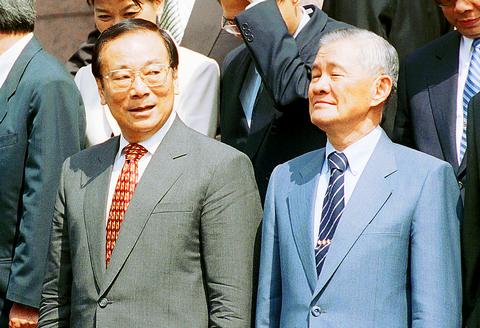The Presidential Office yesterday named Vice Premier Chang Chung-hsiung (
Chang immediately took office and held his first weekly Cabinet meeting, where outgoing Premier Tang Fei (
Chang said that the Cabinet reshuffle triggered by Tang's resignation would be small and announced no later than today in order to maintain political stability.

PHOTO: GEORGE TSORNG, TAIPEI TIMES
The new premier yesterday confirmed, however, that Minister of National Defense Wu Shih-wen (
Su Tzen-ping (
Sources in the Cabinet revealed that Minister of Economic Affairs Lin Hsin-yi (
In addition, deputy secretary general of the National Security Council (NSC, 國安會) Chiou I-jen (邱義仁), is to be the Cabinet secretary-general, replacing Wea Chi-lin (魏啟林).
Editor in chief of the Taipei Times Antonio Chiang (司馬文武) will replace Chiou as the new deputy secretary-general of the NSC.
Meanwhile, Chairman of the Council for Economic Planning and Development Chen Po-chih (
"New appointments of Cabinet members will be based on their professionalism instead of their party affiliation," Chang said at a press conference after yesterday's Cabinet meeting, adding that he would fulfill the president's ideal of "government for all the people" (
In addition, Chang set goals to initiate the so-called "Chen-Chang administration" -- essentially a minority government. "I hereby proclaim that political stability and economic development will be the Cabinet's top administrative priorities," Chang said, adding that he felt cautious and apprehensive after he was informed about his appointment, which was given on short notice.
"However, I will put all the Cabinet's effort into reinforcing coordination among the Cabinet, the legislature and opposition parties, as well as strengthening cooperation among parties," Chang said.
Chang said that the 2001 national spending plan, which was returned to the Cabinet by the legislature yesterday, would be modified and submitted again as soon as possible.
Expressing his gratitude for Tang's contribution during the past four months, Chang said, "Tang has brought peace and stability to the country [
Tang yesterday morning expressed his sorrow at leaving the Cabinet and modestly called himself a "deserter" (
"I've fought a good fight. I have finished my course and I'm left with only good memories," he said.
During yesterday's Cabinet meeting, the controversy over the Fourth Nuclear Power Plant was put on the agenda for discussion, but Chang postponed it.
However, according to DPP Chairman Frank Hsieh (謝長廷), Chang is unlikely to announce the continuation of the plant's construction since he is a DPP member.

DAREDEVIL: Honnold said it had always been a dream of his to climb Taipei 101, while a Netflix producer said the skyscraper was ‘a real icon of this country’ US climber Alex Honnold yesterday took on Taiwan’s tallest building, becoming the first person to scale Taipei 101 without a rope, harness or safety net. Hundreds of spectators gathered at the base of the 101-story skyscraper to watch Honnold, 40, embark on his daredevil feat, which was also broadcast live on Netflix. Dressed in a red T-shirt and yellow custom-made climbing shoes, Honnold swiftly moved up the southeast face of the glass and steel building. At one point, he stepped onto a platform midway up to wave down at fans and onlookers who were taking photos. People watching from inside

A Vietnamese migrant worker yesterday won NT$12 million (US$379,627) on a Lunar New Year scratch card in Kaohsiung as part of Taiwan Lottery Co’s (台灣彩券) “NT$12 Million Grand Fortune” (1200萬大吉利) game. The man was the first top-prize winner of the new game launched on Jan. 6 to mark the Lunar New Year. Three Vietnamese migrant workers visited a Taiwan Lottery shop on Xinyue Street in Kaohsiung’s Gangshan District (崗山), a store representative said. The player bought multiple tickets and, after winning nothing, held the final lottery ticket in one hand and rubbed the store’s statue of the Maitreya Buddha’s belly with the other,

‘COMMITTED TO DETERRENCE’: Washington would stand by its allies, but it can only help as much as countries help themselves, Raymond Greene said The US is committed to deterrence in the first island chain, but it should not bear the burden alone, as “freedom is not free,” American Institute in Taiwan Director Raymond Greene said in a speech at the Institute for National Defense and Security Research’s “Strengthening Resilience: Defense as the Engine of Development” seminar in Taipei yesterday. In the speech, titled “Investing Together and a Secure and Prosperous Future,” Greene highlighted the contributions of US President Donald Trump’s administration to Taiwan’s defense efforts, including the establishment of supply chains for drones and autonomous systems, offers of security assistance and the expansion of

STREAMLINED: The dedicated funding would allow the US to transfer equipment to Taiwan when needed and order upgraded replacements for stockpiles, a source said The US House of Representatives on Thursday passed a defense appropriations bill totaling US$838.7 billion, of which US$1 billion is to be allocated to reinforcing security cooperation with Taiwan and US$150 million to replace defense articles provided to the nation. These are part of the Consolidated Appropriation Act, which the US House yesterday passed with 341 votes in favor and 88 against. The act must be passed by the US Senate before Friday next week to avoid another government shutdown. The US House Committee on Appropriations on Monday unveiled the act, saying that it allocates US$1 billion for the Taiwan Security Cooperation Initiative